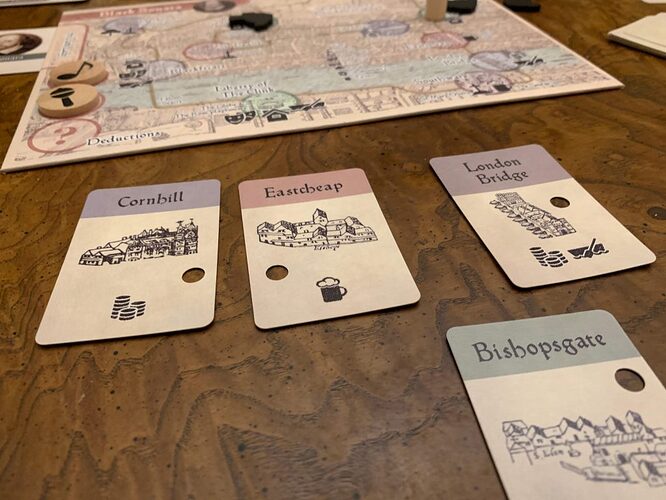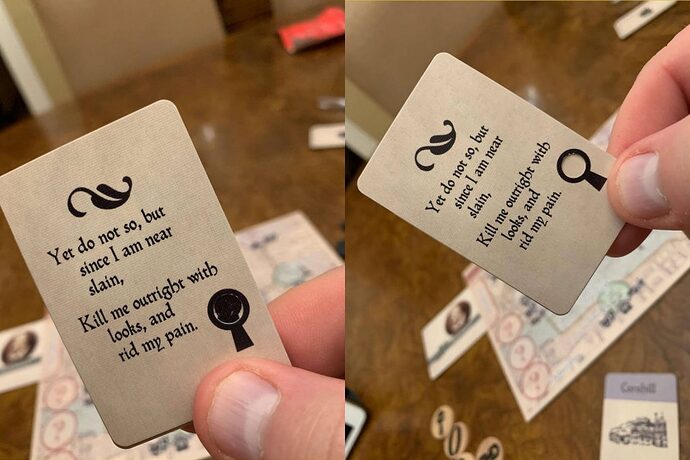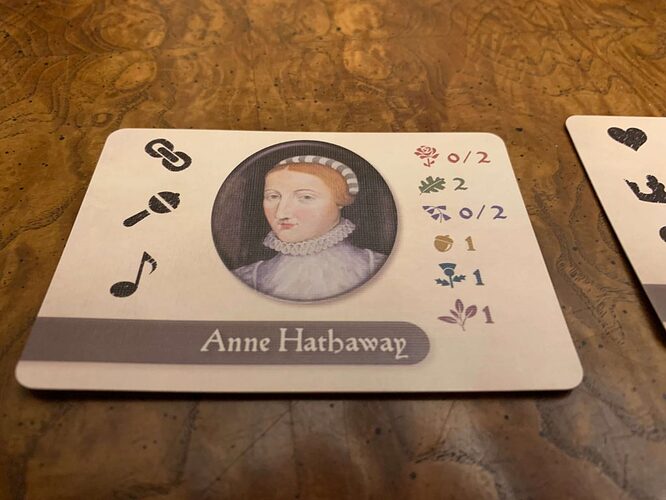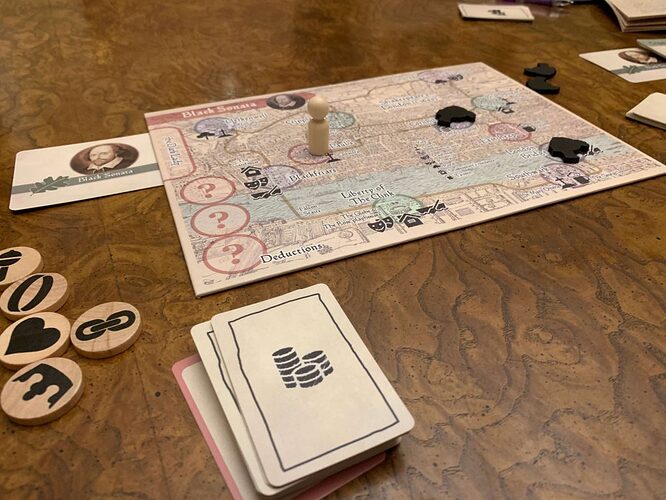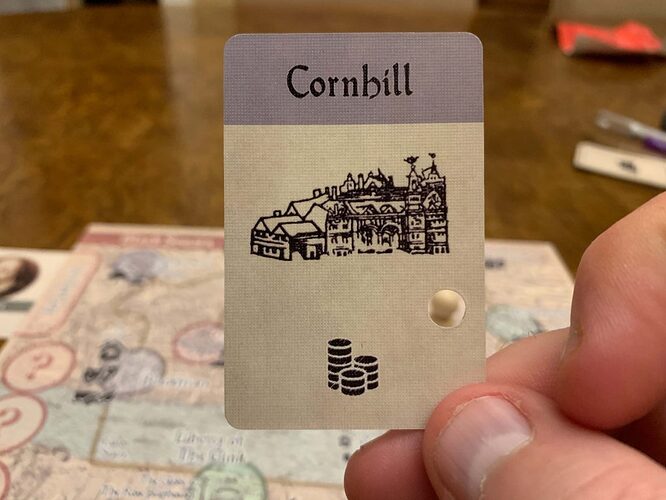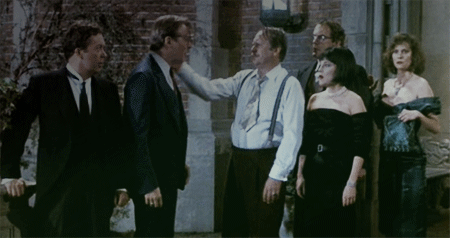Originally published at: https://statelyplay.com/2019/02/20/cardboard-critique-black-sonata/
Tabletop
Remember those math puzzles your friends would quiz you with when you were a kid? They’d always begin by asking for your birth year, adding the day you were born, subtracting the hour, dividing by the number of eggs you had for breakfast and, viola, the answer would reveal, correctly, how many pet otters you’ve owned since the age of six. Having that answer always pop up correctly, no matter who you tried it with, was like a small miracle. It was like opening a portal to universe where magic existed and everything fit into a specific place.
As I grew older and submerged myself in math, the magic was replaced with the cold dissection of numbers and seeing the trick for what it was: a simple math equation. Enter Black Sonata from Side Room Games, which feels like the most complicated math puzzle I’ve ever been dealt. The cool thing is, I can’t see the math and, even if I could, I don’t think I’d be able to suss out how the trick works. The only explanation that makes any sense: Black Sonata is magic. Real magic.
Black Sonata is a solo game (hooray!) in which you play an Elizabethan detective searching for the identity of Shakespeare’s ‘Dark Lady’.
If you’re not aware, Shakespeare was a poet and playwright who lived in London circa 1600. You may have heard of him. [Oooh, Dave thinks he’s so clever. What a douche. -ed.] Anyway, he wrote a shit-ton (the SI term for 154) sonnets, with 28 of them concerning a “dark lady”. Considering how little is known about the Bard’s life, it’s not surprising that we have no idea who this woman was, but that hasn’t stopped scholars from trying to figure it out. Black Sonata posits that there are 12 candidates roaming London, and it’s your job to figure out which is the culprit.
The holes in the cards are where the magic begins.Thus, we have a solo game that is both a deduction game and a hidden movement game. If you’ve played a game like Cluedo, sit back and think about how a solitaire version would work. Don’t think too hard about it, because it doesn’t work. You can’t even play a deduction game like Cluedo or Sleuth effectively with 2 people, 3 or more being the sweet spot. Yet, Black Sonata delivers true deduction by your lonesome. Can you say, magic?
Now you see her, now you don’t.Likewise, sit back and picture a hidden movement game. Scotland Yard, Fury of Dracula, Letters from Whitechapel, Specter Ops, or whatever your hidden movement game of choice. How would any of those work solo? Again, let me just tell you. None of them would. By their very nature a hidden movement game requires at least one person to know where the hidden mover is moving and where they are at any given point. Yet, you guessed it, Black Sonata pulls it off. Magic.
I’m not going to go into details about how it all works (because, honestly, I don’t know), but it involves cards with holes in them that will allow you to see the Dark Lady’s silhouette if you happen to be at the same location in London as your quarry. It involves a deck of cards that is strictly constructed at setup that will control the lady’s movement, but will eventually get mixed up and have sections removed or obscured with fog so you lose her trail. Somehow, it still keeps her on a realistic path so you can use deduction and skill to find her.
I loved her in The Princess Diaries.The dark lady is chosen from one of 12 cards, each with a different candidate complete with 3 traits. At game start, you’ll take one and put it face down under the board. As you successfully locate the dark lady around London, you’ll reveal one of the other cards. It will show you three traits and then tell you how many of those same traits belong to the dark lady you’ve chosen for this game. My explanation of how this works absolutely sucks [I’m glad you said it. -ed.], but putting together which traits can belong to your lady and which cannot is an epic deduction puzzle, and so much more rewarding than the typical deduction game trope of “ask a question and cross that answer off a list”. This is a true logic puzzle and it’s thick and juicy every time you play. The rulebook even offers incredibly smart ways to make the puzzle more or less juicy, and it all works like—dare I say?—magic.
I’ve never played a game like Black Sonata. It feels like a complex machine with a hundred delicate gears turning in unison, and the tiniest shake could break the entire system. It won’t, though. Turns out the game system is robust as hell, and right when you’re wondering if the game will manage to pull something off, it does.
Ready for another go…I’m making it sound deep and complex, but it’s not that bad. I was up and running in a few minutes and, while I had a few questions about the lady’s path in my first game, it all gelled incredibly quickly and games wrap up in 20-30 minutes, tops. Yet, the gameplay doesn’t feel simple. It truly feels like you’re digging into a 400 year-old mystery. It’s simplicity is hidden by a veneer of gravitas.
While I can preach about Black Sonata’s charms all day, the real display of Sonata’s greatness lies in a description of my evening. Black Sonata arrived in the mail yesterday and I immediately put it aside, expecting to not have time to learn it until the weekend. The theme eventually drew me in, however, so I thought I’d give the rules a glance. That led to a learning game, which led to another. And another. And another. Eventually, it was 1:30am and I had just finished my 8th straight game. I would have played a ninth (and, probably, 10th) if I didn’t have to get up and go to work this morning. My kids even wandered over to see what I was doing and ended up sitting and trying to work out the logic puzzle of which traits could or could not be hidden on the Dark Lady’s card.
If you can find a copy, nab it.Black Sonata is a fascinating experience. The entire time I was playing, I kept waiting for the system to break, to delare that I unraveled the equation at the core of the game and, aha!, it’s just math. Just a coldly crafted math problem with an Elizabethan shroud. It’s not, though. Instead, I’m convinced that designer John Kean is a wizard; a conjurer who has sold his soul to craft something that shouldn’t be craftable. A solo game that actually feels like a multiplayer game. A solo game that will have you wishing there were a multiplayer version so you could share it with your friends. A solo game that might be the best deduction game I’ve ever played.
The only explanation that makes any sense is magic.
